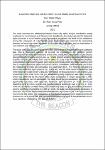| dc.description.abstract | The study examined the relationship between leadership styles and job satisfaction among
employees in Lira District Local Government. Specifically, the study explored the leadership
styles practiced in Lira District Local Government, established the level of job satisfaction
among the employees of Lira District Local Government and examined the relationship
between the leadership styles exhibited by the leadership institutions and job satisfaction in
Lira District Local Government.
The study used cross sectional design to collect and analyze both quantitative and qualitative
data from a respondent category of council; the chairpersons, the Resident District
Commissioner and chief administrative officer who constituted 92 employees of Lira District
local government of salary category U4-U2. Simple random sampling, purposive sampling and
stratified sampling techniques were used to select 92 study units for investigation purposes.
Questionnaires and interview guides were used to collect data while descriptive statistics were
used to measure leadership styles and job satisfaction. Correlation coefficient was used to test
the relationship between job satisfaction and leadership styles. The findings indicated that
democratic leadership style (mean=3.855, SD=0.403) was the most practiced leadership style
while laisez fairre style (mean=2.581, SD=0.554) was the least practiced in Lira District Local
Government. The study found that job satisfaction among employees was above average,
which was confirmed by the overall mean of job satisfaction of (mean=3.513, SD= 0.786),
which indicated the level of satisfaction. The study found that job satisfaction is positively and
significantly correlated with autocratic leadership style (r=0.554, p< 0.05), democratic
leadership style (r=0.639, p<0.05) and transformational leadership style (r=0.474, p< 0.05)
while the correlation between laissez fairre leadership style and job performance indicated a
positive significant relationship (r=0.069, p> 0.05). the study concluded that the application of
autocratic, democratic and transformational leadership style leads to job. The study therefore,
recommends that leaders and management of lira district local government should promote and
embrace the use of democratic and transformational leadership style in their leadership since it
has a significant relationship with job satisfaction | en_US |

